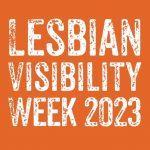Women’s football’s ‘doublethink’ dilemma for Lesbian Visibility Week – Beth Fisher and Lou Englefield on FvH Podcast
Over 40 out women were named in squads at World Cup 2019 – and there’s likely to be many more competing in Australia and New Zealand this summer; however, there’s barely been any acknowledgement in professional women’s football of Lesbian Visibility Week; reporter Beth Fisher and FvH’s Lou Englefield discuss the various reasons behind that in a new podcast episode – listen now!

With big-name brands on board, a launch at the London Stock Exchange and even a surprise reception at the White House, the profile of Lesbian Visibility Week – now in its fourth year – has been bigger than ever in 2023.

The week has been built by DIVA Magazine around Lesbian Visibility Day, observed on April 26 since 2008.
Supported by Stonewall alongside sponsors such as Deliveroo, Centrica and banking giant Citi, LVW celebrates lesbians from all walks of life and sends out a powerful message of solidarity to all LGBTQ+ women and non-binary people.
One of the highlights this year was the cast of ‘The L Word: Generation Q’ making a cameo appearance at a White House press briefing alongside press secretary Karen Jean-Pierre.
However, women’s football at large has been rather reluctant to outwardly engage with #LVW23. There are very few examples of any awareness being raised across the pro game this week.
That’s despite six women in football being named on the annual DIVA Power List, announced on Monday. There are also players past and present nominated in the Sports Personality of the Year category at the DIVA Awards, which will be handed out on Friday night.
On the latest episode of the Football v Homophobia Podcast, sports reporter Beth Fisher and FvH campaign director Lou Englefield discuss the complex factors behind this distancing.
In her journalism career, Beth has worked hard to lift up the voices of LGBTQ+ women in sport, letting others know of the benefits that authenticity brings. She is married to Bristol City coach and Lionesses legend Anita Asante, who is named on the Power List and is also shortlisted for the DIVA Sports Award.
Even though the women’s game has an enviable reputation for being LGBTQ+-inclusive, Beth says it is noticeable how a lot of national governing bodies and leagues are trying to “push away” from any messaging that alludes to sexuality.
While that can be attributed in the most part to cautious marketing and comms strategies, she says there is a subtext too and a level of discomfort or uncertainty about the word ‘lesbian’.

She tells the podcast: “For a lot of girls growing up, the whole stereotype means that it’s been used as a word to offend in schools.
“And especially if you’re a sporty girl – I was definitely called it before I even knew what a lesbian was.
“There’s still this emotion attached to the word itself. Maybe as you get up the ranks, with football governance still mostly being of a generation that I can’t even imagine using the word ‘lesbian’, that then trickles down.
“Does that mean there’s still a stigma amongst the community?
“I don’t know how players within the WSL or Championship feel about being called lesbians. Are they fine with just being called gay?
“We just don’t know enough about how that word is associated with their environments.”
Back in 2018, Beth wrote a column for the Independent about how sporting stereotypes contributed to her hating the word ‘lesbian’ in her youth but that she had now reclaimed it for herself.
She explored this further in an LGBT+ History Month article for Telegraph Women’s Sport in 2020, while later that year – during the first dedicated LVW – Sophie Lawson blogged for Sports Media LGBT+ about how “lesbian visibility in football often means blurred lines”.
A tweet from Sophie this week was a reminder of how tricky this topic can be to navigate.
The challenge of providing representation is a talking point that Lou often encounters in her work on the FvH campaign.

“If you’ve had the word ‘lesbian’ used against you as a term of abuse – particularly if you’ve been targeted with it for playing football – then your associations with it might not be positive,” she explains.
“But there’s a wider issue. It’s still not 100% comfy for [LGBTQ+] women as they progress through football to be hugely visible.
“It’s really easy for our generation, which had a lot of real trailblazers like Neetz [Asante] and Casey Stoney, to think that it’s all in the past and that things have moved on.
“But I don’t think it has moved on in the way we thought it would. If everyone was down with LVW in the women’s game, we’d all be celebrating it.”
Instead, it’s those in the grassroots game – such as pioneering Australian club The Flying Bats – who are most likely to mark the occasion.
Also in the FvH Podcast episode, Beth and Lou talk about tensions created by urban myths about the number of lesbians in women’s football, and how repetition of those myths leads to lesbophobia.
Beth recalls conversations about how having short hair is unusual in the women’s pro game, with Lou noting how attitudes that reflect “conservatism with a small c” are a likely factor in decisions to swerve past Lesbian Visibility Week.
There is praise though from both guests for the Football Association of Wales – named Sport Organisation of the Year at this week’s Sport Industry Awards – for their impactful, public-facing support for LGBTQ+ inclusion over the last few years.
Beth and Lou also discuss newly-released research from the charity Just Like Us that shows how young lesbians report relatively higher levels of shame than other parts of the LGBTQ+ community, while also being the group that is most supportive of trans people other than those who are trans or non-binary themselves.
‘The queer community always has to doublethink things’
While understanding why there is such caution in the game around producing comms that reference sexuality, there is a sense of frustration that LGBTQ+ women aren’t celebrated much at all by women’s sport marketeers when they are so pivotal to its history.
With new data from myGwork showing 75% of LGBTQ+ women celebrate Lesbian Visibility Week, many of those women would surely appreciate a degree of recognition from the sports sector.
Lou adds: “Football could and should be a place where people can be their authentic selves without worries about ‘damaging the brand’.
“I really feel that if football doesn’t celebrate queer women, then it’s an absolute disgrace because queer women have been the backbone of women’s football forever, as spectators, players, administrators, in loads of ways.”
An article by Girls on the Ball’s Sophie Downey for The Guardian’s Moving the Goalposts newsletter this week reminded women’s football that it has “the power to shape a new vision”.
Downey was writing about reactions to an Instagram post showing a picture of players Anna Tamminen and Rosa Herreros kissing after a match between their respective Swedish top-flight clubs.
View this post on Instagram
While the majority of comments were positive, there were some that questioned the professionalism of the players and what the image implied about the women’s game.
“With the way that modern society’s going, and social media, I feel there’s almost like a U-turn,” comments Beth on the podcast.
“While we’re coming so far, and I agree with what Sophie’s saying, we’ve really got to grab the bull by the horns to make sure we steer in our own direction.

“But that’s really hard. Having seen Neetz in that professional environment, and seeing some of the younger girls growing up, money does play a huge part in that now.
“I don’t blame these young women for taking advantage of where the money is because actually for so long, women haven’t been able to make a lot of money – I’m talking to be able to retire from the game comfortably – and now we’re seeing that happen.
“Realistically, put yourself in their shoes, are you going to risk maybe not getting a sponsorship deal or some marketing? It’s a heavy price to pay, isn’t it?
“And again it’s the queer community having to always doublethink about things rather than just being able to be their authentic selves and get on with it, and reap those rewards like the men do.”
Listen to the episode with Beth and Lou to get the full conversation, including their hopes for the Women’s World Cup in Australia and New Zealand, and the effect of losing bars and other spaces where lesbians and queer women could meet safely.
You can also check out previous FvH Podcast episodes for Lesbian Visibility Week, with guests Flo Lloyd-Hughes and Becky Taylor-Gill; and the singer Shura; plus a chat with Anita Asante from July 2020 looking back on her life and career in the game.
Further reading…
Lesbian Visibility Week: Celebrating The WSL Stars Who Are Unapologetically Themselves (Mia Claydon, VAVEL)
‘We should be celebrated – why not!’: Football reporter Emma Dodds and golfer Becky Morgan Q&A
Jo Currie: Lesbian visibility matters in sports media
Lesbian Visibility Day: Sports and thoughts – six women in sports media share their takes
More FvH content in our archive
Sports Media LGBT+ is a network, advocacy, and consultancy group that is helping to build a community of LGBTQ+ people and allies in sport. We’re also a digital publisher and can help with your content requirements. Learn more about us here.
We’re interested in your news and stories. Share with us and tap into a worldwide audience through our Google News affiliate website which attracts thousands of visitors, and our popular social channels. Contact us to discuss how we can help you.


